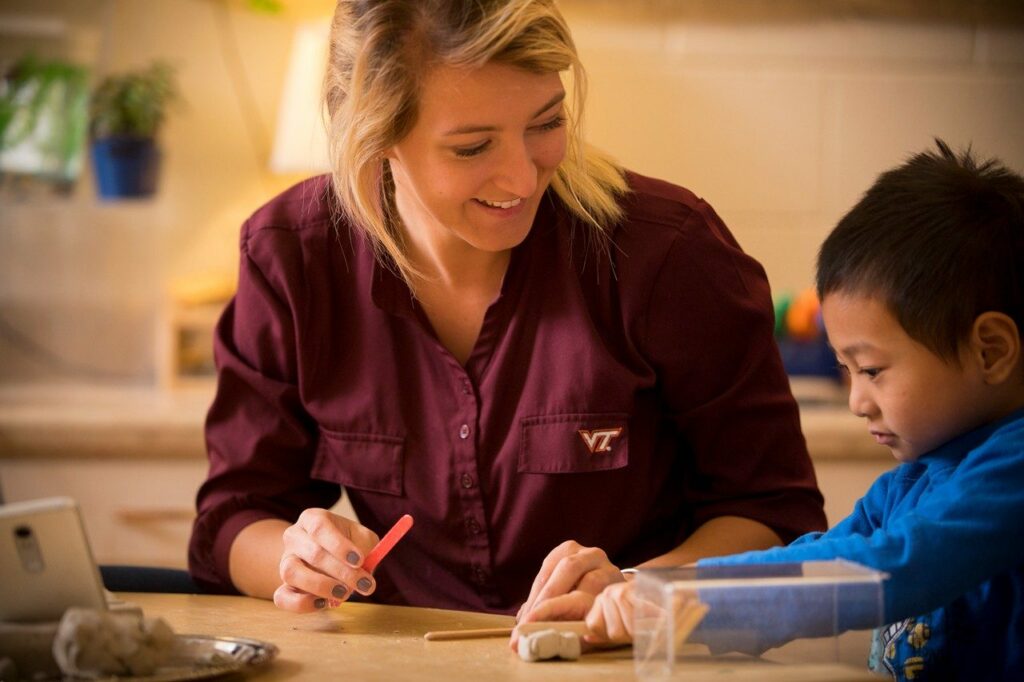A new major at Virginia Tech will provide a valuable resource in support of Governor Ralph Northam’s recently announced plans to increase early childhood education for all Virginians.
The childhood pre-education major, based in the Department of Human Development and Family Science, will provide students with a strong foundation to excel as early childhood educators as well as in occupations that provide emotional support to children, such as counselors, social workers, therapists, and pediatricians.
April Few-Demo, professor and head of the department, said the new major focuses on understanding not only physical child development, but also how family environments affect children. Family dynamics and units are diverse, she said, and how they interact within society has a profound effect on healthy brain development, learning potential, academic success, and future access to resources.
“We’re not just teaching students how to teach,” Few-Demo said. “We’re teaching them to understand the whole child and to know that children do not exist on an island; they exist within a family system. That child navigates both family processes and educational settings. And teachers have to know how to talk to parents in a way that demonstrates their developmental knowledge of the whole child. This approach is what distinguishes our child care center, and it’s at the heart of the philosophy of this major.”
The Child Development Center for Learning and Research is an award-winning program that has a Level 5 rating from Virginia Quality, the state’s voluntary quality rating and improvement system. The National Association for the Education of Young Children ranked the center at 100 percent in all 10 program areas reviewed by the Academy for Early Childhood Program Accreditation team.
Those in the major take courses on infancy, early and middle childhood, and adolescence. They also study human service principles, early childhood curricula, issues in the U.S. educational system, and strategies for nurturing exceptional leaders among children. In addition, the students complete a field study with a local education facility.
“I decided to major in childhood pre-education because I have a passion for children and teaching,” said Anna McElhinney, a sophomore who is also majoring in communication science and social inquiry. “This new major is the perfect program to prepare me for a master’s program and, ultimately, a career as an elementary school principal.”
The program is set up to help undergraduates move toward a graduate degree before becoming a licensed educator and fulfilling roles in teaching, school or behavioral counseling, preschool administration, social work, pediatric medicine, or occupational and physical therapy. Yet opportunities also abound for unlicensed early childhood education providers with bachelor’s degrees. Many preschools and childhood development centers do not require licensure, but look for staff who have a background in education.
“The Child Development Center for Learning and Research loves hiring our majors because we train our students for success in early childhood programs,” said Cynthia Smith, associate professor of human development and family science, director of graduate studies, and director of the Children’s Emotions Lab at Virginia Tech.
Because so many human development students were becoming preschool and elementary school educators, Smith said, the department wanted to provide a specific major in childhood education with courses vital to these students’ career goals. She and her colleagues believe these undergraduates will become leaders in shaping the future of childhood education on state and national levels.
“As educators, we need to value those in childhood education occupations,” Smith said. “From those who provide infants and toddlers with stimulating environments to those aspiring toward graduate degrees in the field, this major is a valuable resource for students, the community, and even the state. Those who graduate with this degree will be of great benefit to society and its demands for quality child care and education.”
Written by Leslie King. Photo by Jason Jones.
